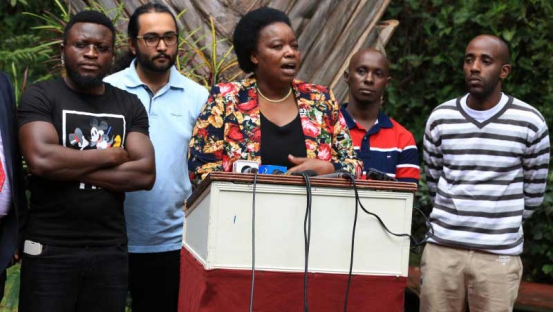Kenya issues travel advisory on parts of South Sudan


By Fauxile Kibet
Kenya Wednesday warned its citizens against traveling to parts of South Sudan which are considered unsafe due to ongoing conflict.
The travel advisory came a day after two Kenyan pilots who had been held hostage by rebels in the oil rich country arrived in Nairobi Tuesday afternoon after being released.
The two pilots have since been released after Sh10.8million settlement.
The pilots were released Monday after a series of negotiations by South Sudanese government officials and their Kenyan counterparts who accompanied the captives back to Nairobi.
The two fell into the hands of the Sudan People’s Liberation Movement-in-Opposition (SPLM-IO) after their plane crashed in a territory held by the rebels, killing one person and 11 cows.
“The Government of the Republic of Kenya deplores the unfriendly and inhumane response of the SPLM-IO to what was an unfortunate accident,” Kenya’s Foreign Affairs Cabinet Secretary Ambassador Monica Juma said.
Since the signing of a comprehensive peace agreement eight years ago, Kenyan investors have trooped into the country in numbers and invested in various sectors such as banking, insurance, aviation, construction, hospitality among other sectors.
But the country has not been stable even after a comprehensive peace agreement signed in Naivasha Kenya as it was drawn back to conflict which escalated after President Salva Kiir fired his Deputy Riek Machar.
PEACE AGREEMENT
The conflict has so far displaced a third of the country’s population and drove the economy to a close collapse despite rich oil deposits. But hopes of the country returning to peace continue to be elusive as the opposition blame the government of making “impossible demands.”
According to a press release by the coalition of South Sudan’s nine opposition groups, the government has made a host of demands aimed at distracting attention from discussing the root cause of the conflict.
The opposition also accused the government of carrying out attacks on Rebel positions in Equatorial, Bahr el Ghazel and Jongeli regions arguing that the purpose of the military operations were to portray the SPLM-IO as not interested in peace.
“The government delegation also made a host of demands, including rejecting demilitarizing Juba and the major towns, dissolution of the sector in order to allow reconstitution of the army in a way reflective of different faces and ethnicities in the country”, the statement read in part.
Peace talks came to a halt on February 16th after days of talks yielded no progress. The Opposition blamed the government side of insisting on maintaining the status quo, hence frustrating efforts aimed at fast tracking necessary reforms.
REGIONAL INPUT
Facilitators of the talks challenged IGAD and the African Union to identify those who violate agreements signed during peace deals adding that the United Nations also should take action and impose tough sanctions on individuals who curtail peace efforts.
However, the South Sudanese government in a statement made attempts to explain its position argued that the peace agreement was “difficult to implement.”
Former Higher Education Minister Peter Adwok Nyaba who is also a leading member of the SPLM-IO led by Riek Machar, while speaking to South Sudanese Media argued that it will be hard to hold credible elections after the transitional period lapses in May 2018.
“Even if it was possible to conduct elections during the rainy season, it would be a futile exercise as there are more than four million South Sudanese living in refugee camps in Uganda, Kenya, Ethiopia, Sudan, the Central African Republic and DR Congo. It would not be possible to bring them back to partake in elections in such a short time,” he said.